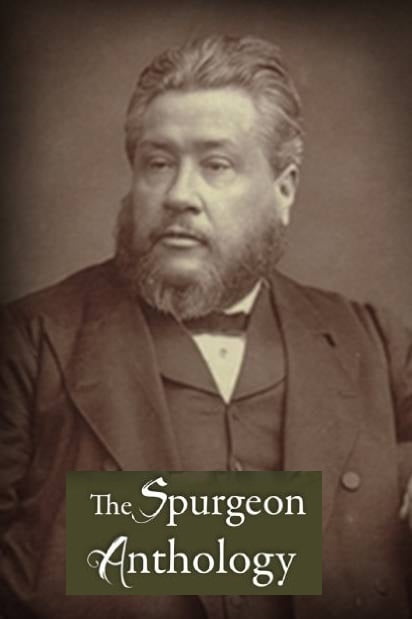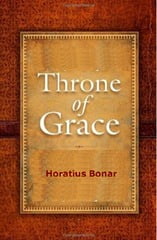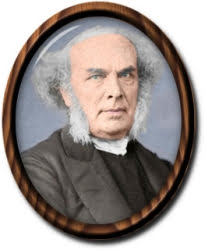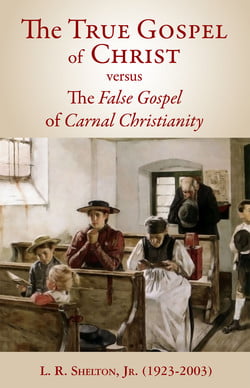
How shall I Approach God
Doctrine by
Horatius Bonar
“How should I go to God?” This can be the most important question we can ask ourselves. Many believers think that they don’t need to go to God because He is already with us. However, we can see in Genesis how human falls into sin. We got separated from God, and the need to seek Him arose.
This collection of Dr. Bonar’s writings deals with the theme of Christian assurance. He tells us that there is a life after death and urges us to be sure of the home to which we are going. Only if we confess our sin and ask Him to cleanse us can we go to Him. It is the first step to restore our fellowship to God where we fear no evil and our sorrows are turned into joy. So let this work serves as a compass as we seek His path.

The Power of God unto Salvation
Doctrine of Mercy by
B.B. Warfield
As you look at the tribulation around, do you despair? Are your decisions shaped by the anxiety for the future? Or are you at peace knowing that He has the power to save us?
This collection contains eight sermons of Dr. B.B. Warfield. He combines knowledge and piety to show how the Gospel molds the Christian’s entire life. His preaching shows his scholarly study and mediations of the Scriptures that’s why scholars selected this work as culturally significant to be preserved, reproduced, and made available to the public.
In this book, may we look at Jesus, not as we are, but as He is and aspires to be like Him. Let’s ponder the treasury of this insightful exposition and learn what it is to live in the light of the Gospel.

Spurgeon Anthology
Collection of Spurgeon books by
Charles Hadon Spurgeon
Charles Spurgeon is dubbed the Prince of Preachers for his influence on different denominations of Christianity. He was equipped with the knowledge of the Bible since childhood, for his father and grandfather were pastors. However, he was only converted when he was 15. At 16, he delivered his first sermon to a small gathering of farmers. At 19, he became the shepherd of a flock in London which later became the Metropolitan Tabernacle. In January 1855, Spurgeon’s sermons were published weekly until 1916, twenty-four years after his death.
This collection contains 21 sermons of the Prince of Preachers. It is frequently requested among the 800 titles available in Chapel’s Library. In this book, let’s discover the key to the success of the Spurgeon’s ministry.

The Throne of Grace
God’s Grace by
Horatius Bonar
As men, we are born tainted with sin. We were condemned to be apart from God’s presence by the sins of our forefathers. But is there a means to reverse it? How can we obtain forgiveness and be reconciled to God? The Throne of Grace is a Theo poetry of the goodness of God. It examines the prayer life, communion, and faith of a believer. It shows that Christ is not only a High Priest who has compassion on someone who’s out of the way but a friend who sanctified us through His sacrifices. Bonar is a Scottish poet and minister. He came from a line of ministers who served the church of Scotland for a total of 364 years. His life is no rainbow and butterflies, though. He suffered loss and hardships like any human beings. But this suffering brings out the poetry in writings which is evident in every work he penned.

Treasures of Bonar
Anthology of Bonar Books by
Horatius Bonar
If bad things happen in your life despite being faithful to the ministry, what will you do? Will you turn your back from God, or will you persist and walk towards Him?
Horatius Bonar is a gifted pastor, preacher, and hymn writer, and this book is a compilation of outstanding quotations from him. The discussions are divided into 12 topics ideally useful in studying doctrinal truths about the Gospel, sanctification, salvation, suffering, missions, and marks of a true Christian. Doctrines that are distasteful to human pride but are scriptural.
A man who endured numerous tribulations, Bonar’s life and ministry are indeed sustained by the hands of God. A source of encouragement for anyone who values Christian teaching, his timeless truth should be introduced to a new generation of readers.

The Gospel of Christ vs Carnal Christianity
Doctrine – Theology by
L.R. Shelton
What does it take to claim that you’re a Christian? Do we need to be pure, or is it ok to deliberately sin? What disqualifies us in taking His name?
This book is a detailed evaluation of “easy-believism” where justification in Christ is offered with liberty but without responsibility. That teaching holds that man can receive Christ without bowing to His authority—a belief held by carnal Christians. However, Shelton argues that there is no such thing as carnal Christianity. If a professed believer is carnal, then he is not a Christian at all.
This work is a rebuke to shake off any false sense of security not grounded on His true teachings. However, it is also an encouragement to those who are devoted to God. It aims to strengthen our faith as we walk and serve Him with all our hearts. May we found that strength as we go through its pages.

The Attributes of God
Doctrine – Theology by
A.W. Pink
How do you view God? Do you see Him as a tyrant who wants to rule your life but never respects your feelings, or do you see Him as a loving Parent who may be disciplinary at times but wants what’s good for you? Do you want the power to control everything in your life even if you end up destroying yourself, or do you find comfort knowing that there is God who can turn your bad situation upside down? In this book, Don Fortner enumerated the characteristics of God. He explained that if we fail to understand his attributes and think of him as a fallible being like us, it will lead to the twisted perception of His Holiness that can make us turn away from Him. But if we trust that He wants everything for our good, we can see the beautiful things He is making in His time.

Calvin on Self Denial
Doctrine – Theology by
John Calvin
In his book that tackles the concept of self-denial, John Calvin discusses our relationship with Christ, interactions with people, sanctifications, trials and difficulties in a simple and concise tone. He communicates truth unapologetically and gracefully, the book is a reflection of Christ’s teachings and duties of believers to promote the glory of God. Calvin encourages his readers to exhibit greater proficiency by faithfully obeying God and his commandments, shunning all private regards to them including wealth and power that may distract our minds in pursuit of favors, luxury, applause and worldly ambitions. He further criticizes the practice of virtue that is followed by desires and the sake of praise, arguing that outward works have to be done from a pure feeling of love. John Calvin was a man who devoted himself entirely to the service of God, abandoning his own will, and he asks his readers to do the same.